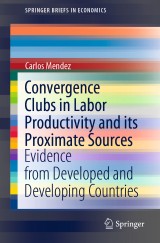Details

Convergence Clubs in Labor Productivity and its Proximate Sources
Evidence from Developed and Developing CountriesSpringerBriefs in Economics
|
53,49 € |
|
| Verlag: | Springer |
| Format: | |
| Veröffentl.: | 05.11.2020 |
| ISBN/EAN: | 9789811586293 |
| Sprache: | englisch |
Dieses eBook enthält ein Wasserzeichen.
Beschreibungen
<p></p><p>Testing for economic convergence across countries has been a central issue in the literature of economic growth and development. This book introduces a modern framework to study the cross-country convergence dynamics in labor productivity and its proximate sources: capital accumulation and aggregate efficiency. In particular, recent convergence dynamics of developed as well as developing countries are evaluated through the lens of a non-linear dynamic factor model and a clustering algorithm for panel data. This framework allows us to examine key economic phenomena such as technological heterogeneity and multiple equilibria. In this context, the book provides a succinct review of the recent club convergence literature, a comparative view of developed and developing countries, and a tutorial on how to implement the club convergence framework in the statistical software Stata.</p><p></p>
<p>1 Introduction.- 2 The Data: Productivity and Capital Differences across Countries and over Time.- 3 Two Complementary Frameworks to Study Convergence Clubs.- 4 Convergence Clubs in Labor Productivity.- 5 Convergence Clubs in Physical and Human Capital.- 6 Convergence Clubs in Total Factor Productivity.- 7 Accounting for Convergence Clubs.- 8 Conclusion.</p>
<p></p><p>Carlos Mendez is an associate professor of development economics at the Graduate School of International Development (GSID) in Nagoya University, Japan. He is also the founder and director of the Quantitative Regional and Computational Science Lab (QuaRCS-lab). He has worked as a consultant for Pro-Mujer International, The World Bank, DANIDA, and JICA. He holds an M.A. and a Ph.D. in international development from Nagoya University. His research interests focus on the integration of econometrics, spatial data science, and machine learning methods to understand and inform the process of economic growth and development. In particular, his current research is in (1) the quantitative geography of development and inequality; (2) economic growth and convergence; (3) regional labor market outcomes and macroeconomic shocks; and (4) structural change and firm productivity dynamics.</p><p> </p><p> </p><p></p>
<p><br></p>
Presents an updated empirical treatment on the issue of productivity convergence across countries Provides a comparative view of developed and developing countries along multiple productivity-related variables Includes data and Stata code to reproduce the main figures, tables, and analyses of the book

















